
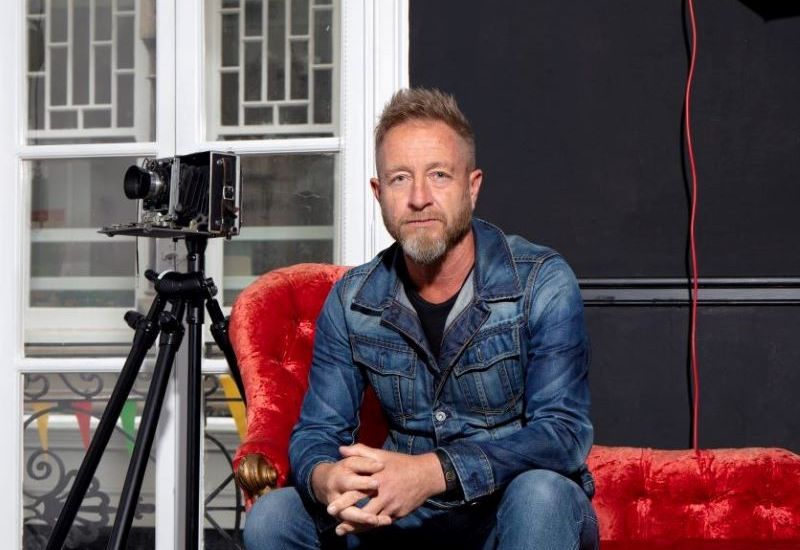

Much of Paul Chambers’ distinctive photography is about his striking use of light and shade – which is also a fitting metaphor for a 50-year journey of diverse accomplishments and dark intervals.
"Photography has helped saved my life. Every time I go through something scary or traumatic, I survive by taking pictures," says Paul.
"I unashamedly love taking pictures and capturing moments. Pictures provide a means of holding, intensely, a moment of communication between one human and another. I want to tell stories that matter: of people who have been forgotten, left behind."
Paul spoke to Matt Fallaize about his life and work, originally for CONNECT magazine, and reproduced here for Express.
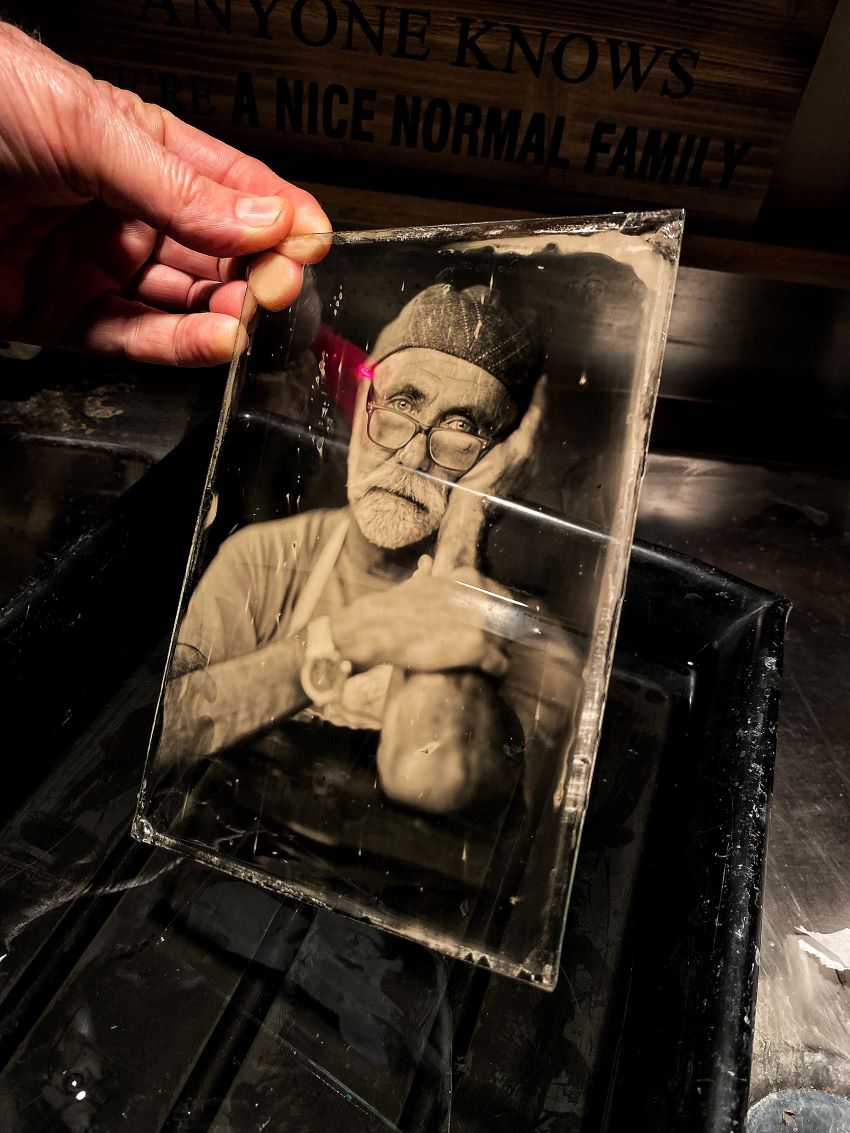
Pictured: Paul has a long interest in photography but turned it into a career only in 2019. Credit: Paul Chambers.
Jackson Chambers Photography is thriving out of a studio in Commercial Arcade which Paul has meticulously and exquisitely restyled without any loss of charm or character since taking it over from Graham Jackson in between the two covid lockdowns.
"Fifty-nine years there’s been a studio here. It's one of the few studios left," says Paul. "I like people being able to come here and go through an experience. I'm excited about who's going to walk through the door, what phone call am I going to get, what project is next, and how I can balance the beauty and pleasure of photography with paying the bills and being a business. We're nearly there. By the autumn, I hope to be offering wet plate portraits" – which use something known as the collodion process, the second-oldest form of photography, and which Paul, borrowing from one of his heroes, Bruce Springsteen, calls his "magic trick".
Paul says he's the happiest he's been, having rebuilt relationships with his adult children, Hannah and Samuel, and sharing life with a partner he adores: "Without Sarah, I’d be dead. We’re pretty tight as a couple. She has seen me at my very worst and I've seen her at some pretty low points too." Paul is five years sober. "I try not to focus too much on counting time. I like to say there's been a few miles between me and my last drink. I don't drink. I can't drink if I want to stay well and avoid a tsunami of carnage."
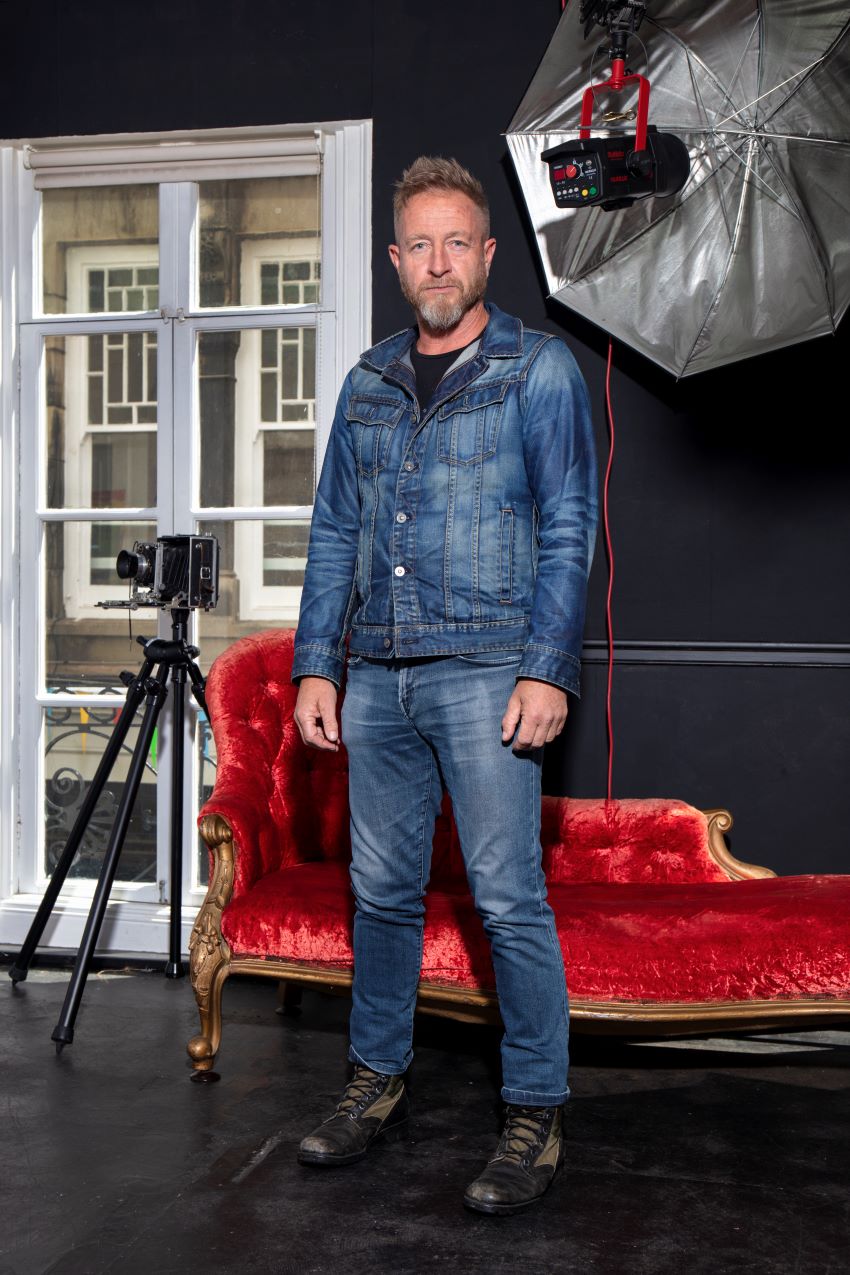
Pictured: Alcoholism nearly killed Paul before he rebuilt his life around his partner, Sarah, his children, Hannah and Samuel, and photography. Credit: Aaron Yeandle.
Paul's 40s were consumed by alcohol. He was happy enough at work, running the island's first restorative justice scheme. "I was facilitating courageous conversations and trying to help people stop the ripple effects of hurt. It was one of the most satisfying things I've ever done. I was hopeless at the administration side of it, but as a practitioner I couldn't have dreamed of falling into something I felt so good about. The problem was that around that time some stuff in my personal life was not healthy."
Paul’s marriage was collapsing and at the height of his addiction he was drinking a case of wine a day.
"I’d started to lie about where I was and what I was doing. I was organising my own diary and I'd started to cover up that I was spending literally every afternoon drinking heavily. Through restorative justice, I met someone who had been married to George Best, and she said that he would take a bottle of wine to bed. I suddenly realised I was doing the same. There was never a moment when I was sober. I could get through four hours at work in the morning, rattling a bit and thinking about drinking at lunchtime. I'd have two bottles of wine at lunchtime, another three or four in the afternoon, a couple of bottles in a bar on the way home, and three or four bottles in the evening."
With support from Alcoholics Anonymous, Paul was on the wagon for two years, which included a failed attempt to reconcile his marriage. "I left again and had a spectacular relapse. There was one Friday night when I remember buying two litres of vodka and then nothing else until I was found on the Tuesday morning with 13 empty litre bottles of vodka. I really shouldn't be here. They said we need to hospitalise you – or someone you trust implicitly needs to come in and be with you over the next few days to make sure you don't seizure. There was only one person I trusted and that was Sarah."
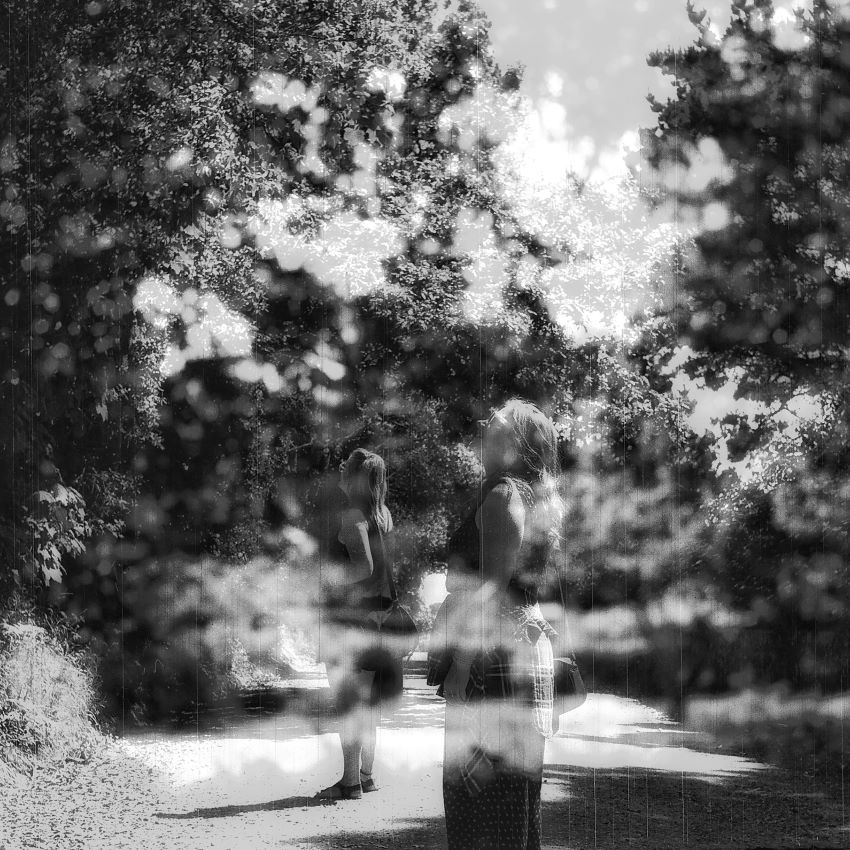
Pictured: Paul's distinctive approach quickly made its mark on the local photography scene. Credit: Paul Chambers.
Paul and Sarah had met through work. Sarah was a probation officer in Cardiff with experience of restorative justice and working with addicts. "She immediately dropped everything and came over to Guernsey the next day and stayed with me, measuring how much I could drink each day to ween me off it. Then started another crazy period. I was then living in an unpleasant place in Havilland Street. I carried on drinking. I was lost. I had no direction. I was a shell of a human being. Totally confused. It's a cruel, cruel illness. And not many make it through."
Paul had a month as an out-patient at a rehabilitation centre in South Wales but quickly resumed drinking on his return to Guernsey. He had lost his job in restorative justice and another role in the public sector was not working out. Sarah permanently relocating to Guernsey was probably the decisive moment in Paul's recovery.
"Sarah and I realised there was a lot of love and affection between us. She was looking for a new challenge and so she came over here. It was a fresh start for her and having someone with me would give me a better chance of staying well. It was Sarah's understanding of my illness and knowing how to help which saved me."
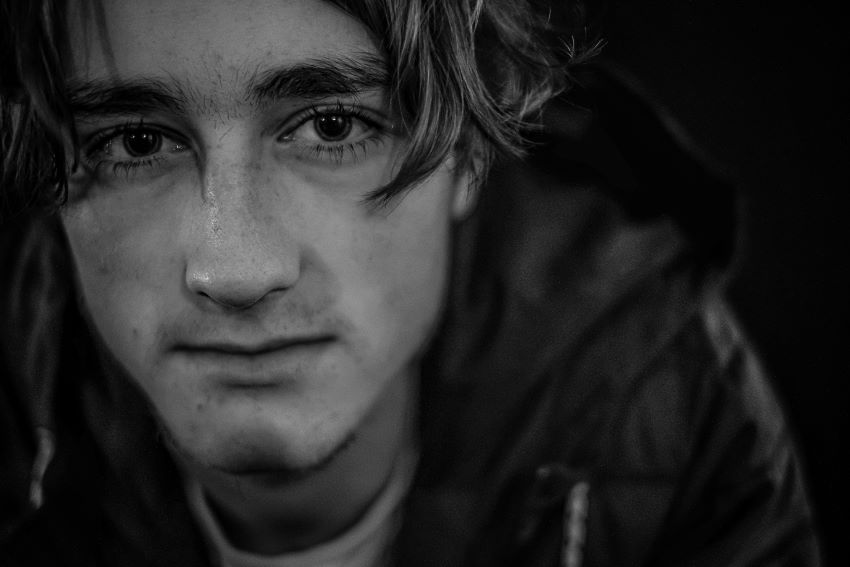
Pictured: Paul has a diverse portfolio from weddings to corporate events to magazine shoots - such as for CONNECT, the sister publication of Express - but his principal interest is portrait photography. Credit: Paul Chambers.
Paul is visibly still pained by what he knows his children saw of him in his darkest days. "The best amends I can make to them is to be the best version of myself I can be and that starts with not picking up a drink." I ask Paul if he still finds that difficult. "Not anymore. It was the first year or so and I know I'm never cured.
"I remember waking up lost every morning. Waking up with no purpose, no belief, thinking any good in me was dead. I thought everything I'd touched had failed. I'm very lucky now to be doing something I love and to be surrounded by people I love. I approach every day with gratitude."
Paul was born in Barnsley. His mum was 14 when she fell pregnant. He was adopted at two weeks old by parents who lived the other side of South Yorkshire, in a mining village in Rotherham. "I couldn't have wished for a more loving home. It was a very simple, terraced house surrounded by everything to do with coal mining. Everything was red – staunch Labour – which completely informed my politics.
"I was 14 when the miners' strike started. The time when I was just starting to think for myself. That was the defining event which shaped my outlook on life – my politics, what I felt was fair and right and good. I saw our community ripped apart overnight. They took away much more than jobs. They destroyed the very thing which united us. I can never forgive that. You find people like Tony Benn, who was a beacon of light and care and integrity for the forgotten and the people left behind. For me, the best Prime Minister we never had was John Smith – then I think the 1990s onwards would have been very different."
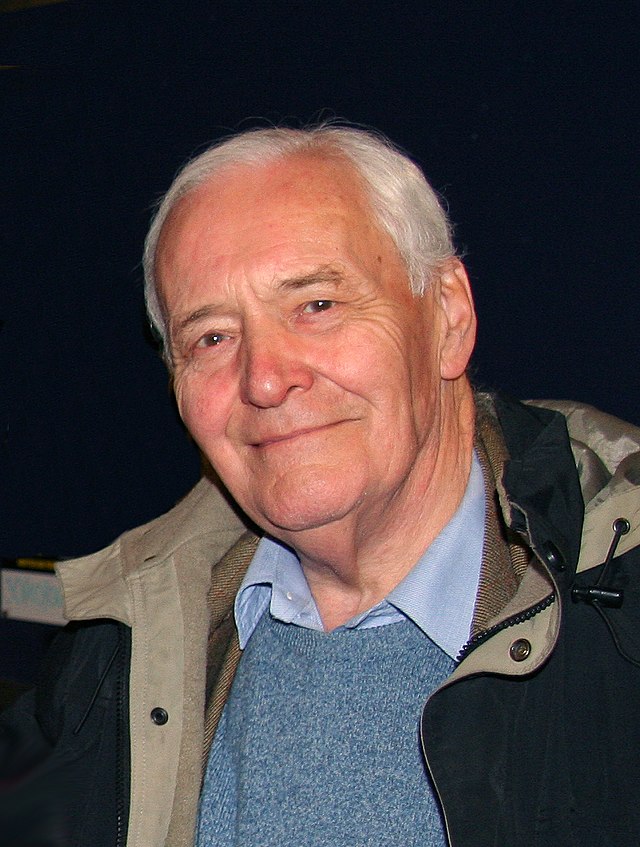
Pictured: Paul's interest in politics was sparked by the miners' strike when he was in his early teens in the mid-1980s and he was inspired by Tony Benn's "concern for humanity".
Many of Paul's friends left school as soon as they could. "I saw friends who were bright, full of energy and ideas, but they soon had no hope and they just died." He stayed on to do A levels, ending up as head boy of his school, a role held by William Hague in the year Paul started. He loved sport and played rugby and football to a good standard. But it was art which he felt offered "a way to escape". He enrolled on arts courses, first in Rotherham and then in Cheltenham, before finding himself staying with family friends in Guernsey.
What was meant to be a summer here has turned into 32 years and counting. For 10 years, Paul worked as a tree surgeon – "I fell in love with it on day one" – before spending a decade as Assistant Manager at Les Cotils Christian Centre, where he was then living, and then launching the restorative justice scheme.
Paul talks of "spirituality" rather than religion. "I'm a liberal backslider. Sarah and I go to St John's. We set up a community project there for vulnerable people and, on Tuesdays, we create a safe space for people to chat and have company and food. There's an element of journeying together and stumbling towards a better version of ourselves. If you really read your Bible and the Gospels and look at the stunning ethical demands of a carpenter from Palestine…I'm not interested in the rest…if I can commit my life to that, that's not a bad thing."
While at Les Cotils, Paul became involved in the ecumenical movement and Christian charities, which took him to divided communities around the world, including Belfast, Palestine and West Africa, a trip which later proved a turning point in bringing the Fairtrade movement to Guernsey. He kept a photographic journal of some of these visits, which meant he had recent experience of the power of photography when he was "trying to find something creative as part of recovery from addiction" a few years later.
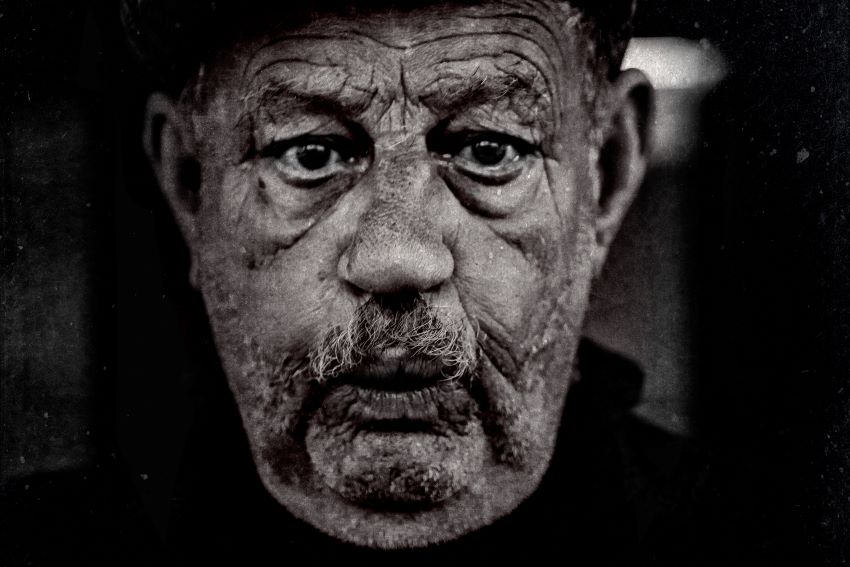
Pictured: One of several beautiful and intriguing portraits which hang in the entrance of Paul's studio in Commercial Arcade. Credit: Paul Chambers.
"I made a choice to go freelance in October 2019. We were in a position where I didn't have to worry about work for the rest of that year. I'd met Graham Jackson – through both using Fuji – and we’d got to know each other quite well for about a year. When we were beginning to come out of the first lockdown, Graham asked me to pop round for a socially distanced cup of tea. He told me he'd been wanting to retire for about five years and that he'd love me to take it on. On 1 July 2020, I took over here.
"I wake up every morning and I come here or I get to photo great people at their wedding yesterday or I get to do a great shoot at the Bathing Pools at 06:30 this morning. I sit on literary, photography and Women in Public Life committees. How lucky am I?
"I’ve had so much kindness from people who in some cases I didn't even know knew me. From Bailiffs, deputies, teachers, ex-colleagues, lads I worked with in the prison. I don't feel there were many people who disliked me. Anyone worth their salt realised I wasn't a bad person in the past – I was just making unhealthy decisions. After lockdown, I found that people were willing to take a chance on someone new who was doing something a bit different with photography.
"I have found myself and my voice through the medium of photography. People interest me. I've always been drawn to the marginalised, downtrodden, voiceless. The disparity between the haves and have nots is extraordinary in Guernsey – more obvious than anywhere else I've lived. I don't understand why many people can't see this here."
Pictured: Paul takes great pleasure and pride in his photography of all parts of society in Guernsey. Credit: Paul Chambers.
Paul continues to attend AA meetings weekly, partly because he remembers the encouragement he once drew from people who had been a long time dry, and he hopes to help other alcoholics see that there can be a journey of recovery ahead of them.
In difficult moments – "when I need to let go of the destructive parts of my life" – he finds comfort in the words of Springsteen: "We all have our broken pieces. Emotionally, spiritually, in this life nobody gets away unhurt. We're always trying to find somebody whose broken pieces fit with our broken pieces, and something whole emerges…I found this with Sarah…Life's mysteries remain and deepen, its answers unresolved.
"So, I walk on through the dark because that's where the next morning is. And I guess that's where the connection is with recovery and photography. Something happens between an addict and the darkness which is similar to the process of developing photographs, the way we did it before the digital age. The photograph, as it was printed in the darkroom, became visible, bit by bit. As you walk on through the darkness of living, a day at time, the same chemical process takes place. The inner chambers of the soul are like the photographer's darkroom; like a laboratory. One cannot stay there all the time or it becomes the solitary cell of the neurotic. Like the pictures I make, eventually I have to leave the darkness and walk into the light, the beginning, and know it for the first time."
Main image credit: Aaron Yeandle.
Comments
Comments on this story express the views of the commentator only, not Bailiwick Publishing. We are unable to guarantee the accuracy of any of those comments.